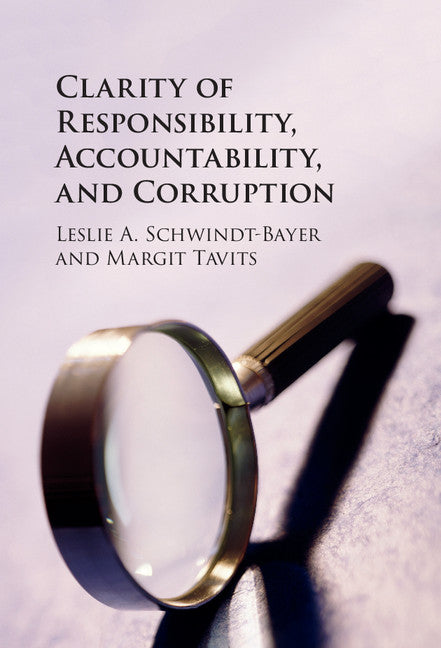Freshly Printed - allow 8 days lead
Couldn't load pickup availability
Clarity of Responsibility, Accountability, and Corruption
The book argues that clarity of responsibility increases accountability and decreases corruption levels in democracies tested empirically.
Leslie A. Schwindt-Bayer (Author), Margit Tavits (Author)
9781107566927, Cambridge University Press
Paperback / softback, published 25 May 2017
218 pages, 33 b/w illus.
23 x 15.3 x 1.5 cm, 0.34 kg
'Schwindt-Bayer and Margit Tavits have produced an excellent book on the obviously-important topic of corruption. They have offered a powerful theory about how clarity of responsibility shapes the incentives for elites to pursue corrupt practices and voters to hold them accountable. They provide an accessible example of how researchers can use a multi-method approach to thoroughly test a new theory and to overcome data limitations. This book is a must read for anyone interested in the causes and consequences of corruption.' Guy D. Whitten, Texas A & M University
Corruption is a significant problem for democracies throughout the world. Even the most democratic countries constantly face the threat of corruption and the consequences of it at the polls. Why are some governments more corrupt than others, even after considering cultural, social, and political characteristics? In Clarity of Responsibility, Accountability, and Corruption, the authors argue that clarity of responsibility is critical for reducing corruption in democracies. The authors provide a number of empirical tests of this argument, including a cross-national time-series statistical analysis to show that the higher the level of clarity the lower the perceived corruption levels. Using survey and experimental data, the authors show that clarity causes voters to punish incumbents for corruption. Preliminary tests further indicate that elites respond to these electoral incentives and are more likely to combat corruption when clarity is high.
1. Introduction
2. A clarity of responsibility theory of corruption
3. A dataset of democracy and corruption
4. Clarity of responsibility and aggregate corruption perceptions
5. Corruption voting - a survey analysis
6. Corruption and accountability - an experimental analysis
7. The effect of clarity on elite efforts to combat corruption
8. Beyond anticorruption efforts - elite attention to corruption
9. Conclusions.
Subject Areas: Political economy [KCP], Political corruption [JPZ], International relations [JPS], Political structures: democracy [JPHV], Elections & referenda [JPHF], Comparative politics [JPB]


